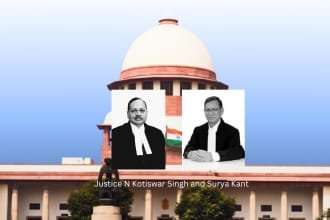Introduction
The Supreme Court of India has once again reinforced the principle that anticipatory bail should not be denied merely because incriminating material was not discovered during investigation. In Jugraj Singh v. State of Punjab, the Court clarified that non-discovery of incriminating evidence cannot be equated with non-cooperation by the accused. This ruling highlights the balance between the rights of the accused under Article 21 of the Constitution and the powers of the investigating agencies.
The judgment is significant in the context of criminal jurisprudence on anticipatory bail, particularly where the prosecution seeks to oppose bail on vague grounds such as alleged non-cooperation.
Background of the Case
The appellant, Jugraj Singh, was implicated in a criminal case solely based on the confessional statement of a co-accused, from whom recovery had been made. Notably, this was not the first time he was booked under similar circumstances. In an earlier case, he had also been implicated on the basis of a co-accused’s statement but was granted anticipatory bail.
When the Punjab and Haryana High Court denied him anticipatory bail in the present case, the appellant approached the Supreme Court.
In June 2025, the Supreme Court issued notice on his plea and granted interim protection from arrest, subject to his joining the investigation. The State, in its counter-affidavit, alleged that the appellant was not cooperating since he had admitted during questioning that he had thrown his mobile phone into a river.
Issues Before the Court
- Whether non-discovery of incriminating material can be treated as non-cooperation by the accused during investigation.
- Whether anticipatory bail should be denied solely on the allegation of non-cooperation without concrete evidence.
Observations of the Court
The Bench of Justices Manoj Misra and Ujjal Bhuyan made the following important observations:
- On Cooperation During Investigation: The Court noted that the appellant had indeed joined the investigation when called upon. Merely because nothing incriminating was discovered during this process, it does not imply that the accused was uncooperative.
- On Alleged Destruction of Evidence: The Court pointed out that the State did not show any effort to trace the mobile number of the appellant, collect his call detail records (CDRs), or conduct raids to recover incriminating material. In the absence of such steps, the allegation that the appellant threw his mobile into the river was not sufficient to prove non-cooperation.
- On Earlier Precedent: The Court also considered that in an earlier case, the appellant was booked on similar grounds based on the statement of a co-accused and was granted anticipatory bail. This strengthened the case for extending similar protection in the present matter.
Decision of the Court
The Supreme Court disposed of the appeal by making the interim order of anticipatory bail absolute. The relief was made subject to the following conditions:
- The appellant shall cooperate with the investigation.
- He shall furnish bail bonds before the trial court.
- He shall not threaten witnesses or tamper with evidence.
Thus, the Court granted final anticipatory bail protection to the appellant.
Legal Significance of the Ruling
1. Clarification on Non-Cooperation
The ruling clarifies that non-discovery of incriminating material is not synonymous with non-cooperation. This is vital because investigating agencies often oppose anticipatory bail by claiming the accused is not assisting in the investigation when, in reality, no evidence surfaces against him.
2. Safeguard Against Misuse of Confessional Statements
The case once again shows the limited evidentiary value of a co-accused’s confessional statement. Merely naming another person cannot justify custodial interrogation unless supported by independent corroboration.
3. Reinforcement of Article 21 Protections
By granting anticipatory bail, the Court protected the appellant’s right to personal liberty under Article 21. The judgment reiterates that bail should be the rule, and arrest should be an exception unless strictly necessary.
4. Guidance for Future Bail Applications
This ruling will serve as an important precedent in anticipatory bail applications, particularly where the prosecution claims non-cooperation without substantive proof.
Related Supreme Court Judgments
This decision aligns with earlier landmark rulings such as:
- Siddharam Satlingappa Mhetre v. State of Maharashtra (2010) – where the Court held that personal liberty should not be curtailed except for compelling reasons.
- Arnesh Kumar v. State of Bihar (2014) – where the Court discouraged unnecessary arrests in cases punishable with less than seven years of imprisonment.
- P. Chidambaram v. Directorate of Enforcement (2019) – where the Court reiterated that anticipatory bail cannot be denied merely because the case involves serious allegations.
The present case adds another dimension by clarifying that failure to recover incriminating evidence cannot be used as a ground to allege non-cooperation.
Implications for Accused Persons
- Accused persons cannot be harassed with allegations of non-cooperation when they have complied with investigation requirements.
- The judgment prevents investigating agencies from adopting a mechanical approach of denying bail merely because no recovery is made.
- It also reduces the risk of custodial harassment in cases where the only link to the accused is a co-accused’s statement.
Conclusion
The Supreme Court’s decision in Jugraj Singh v. State of Punjab is a reaffirmation of the principle that anticipatory bail is a safeguard against arbitrary arrest. The ruling sends a strong message that mere absence of incriminating recovery cannot be twisted into an allegation of non-cooperation.
By protecting the rights of the accused while ensuring that investigation can continue without interference, the Court has struck a balance between individual liberty and the needs of criminal justice administration. This case will undoubtedly serve as a guiding precedent in future bail jurisprudence.
Also Read


